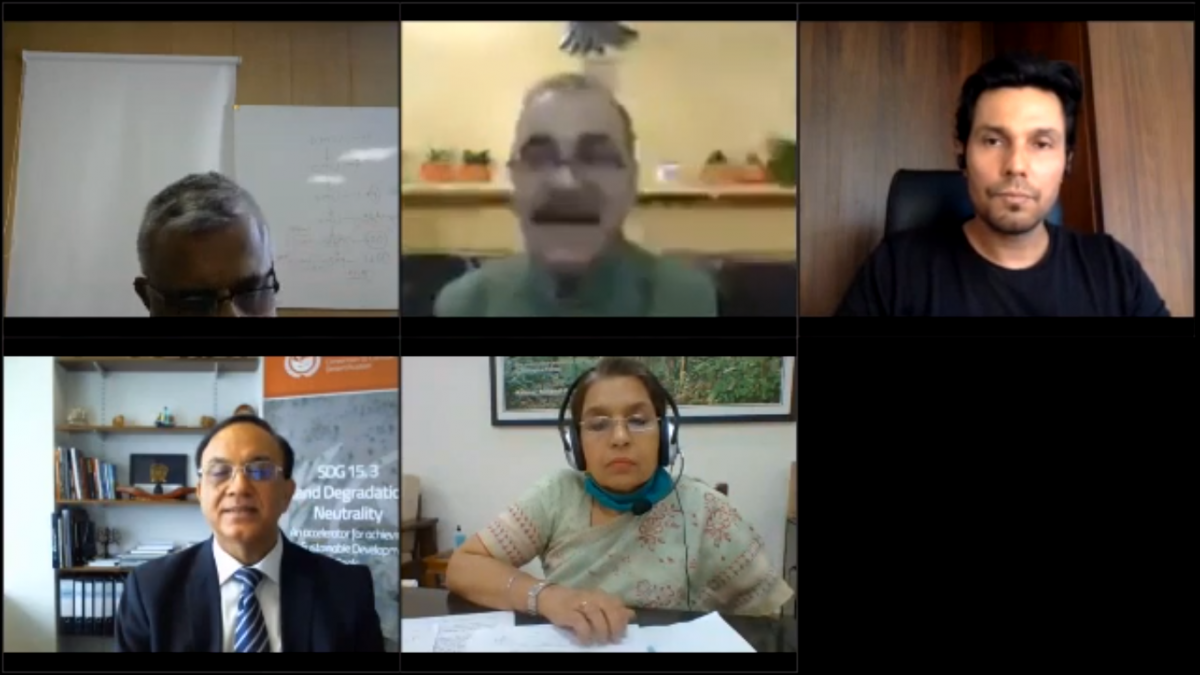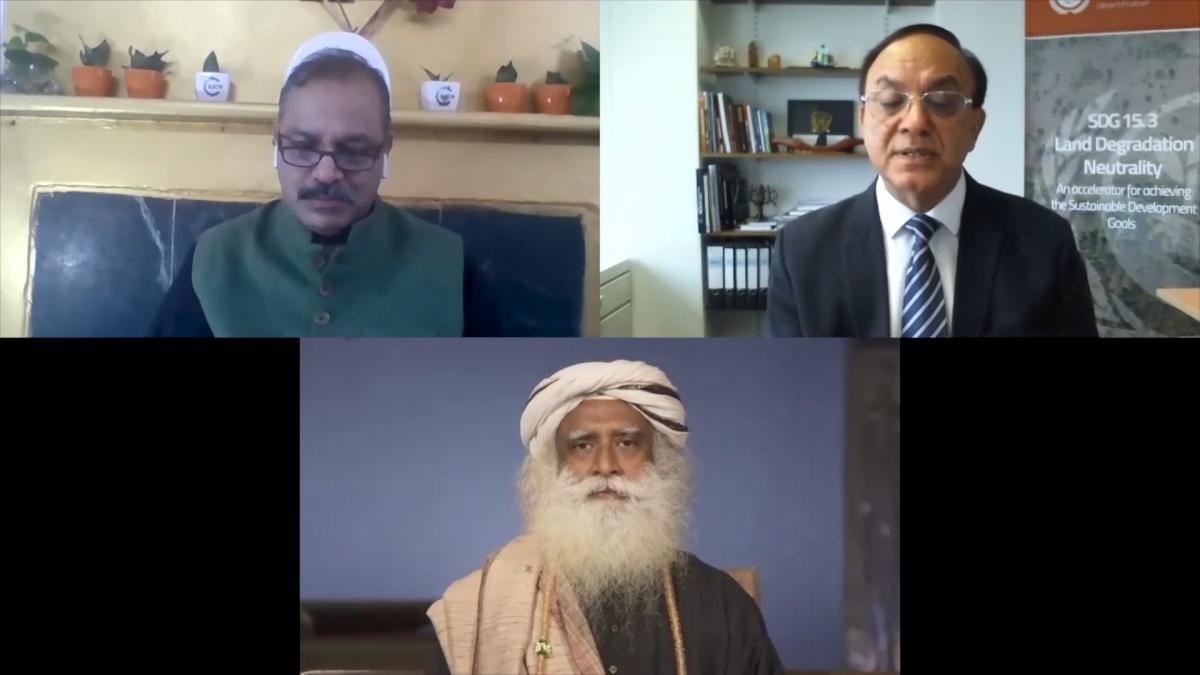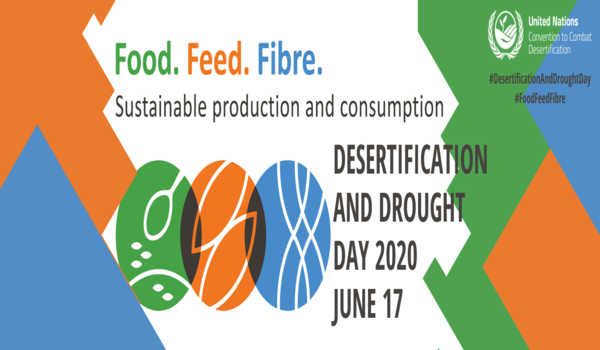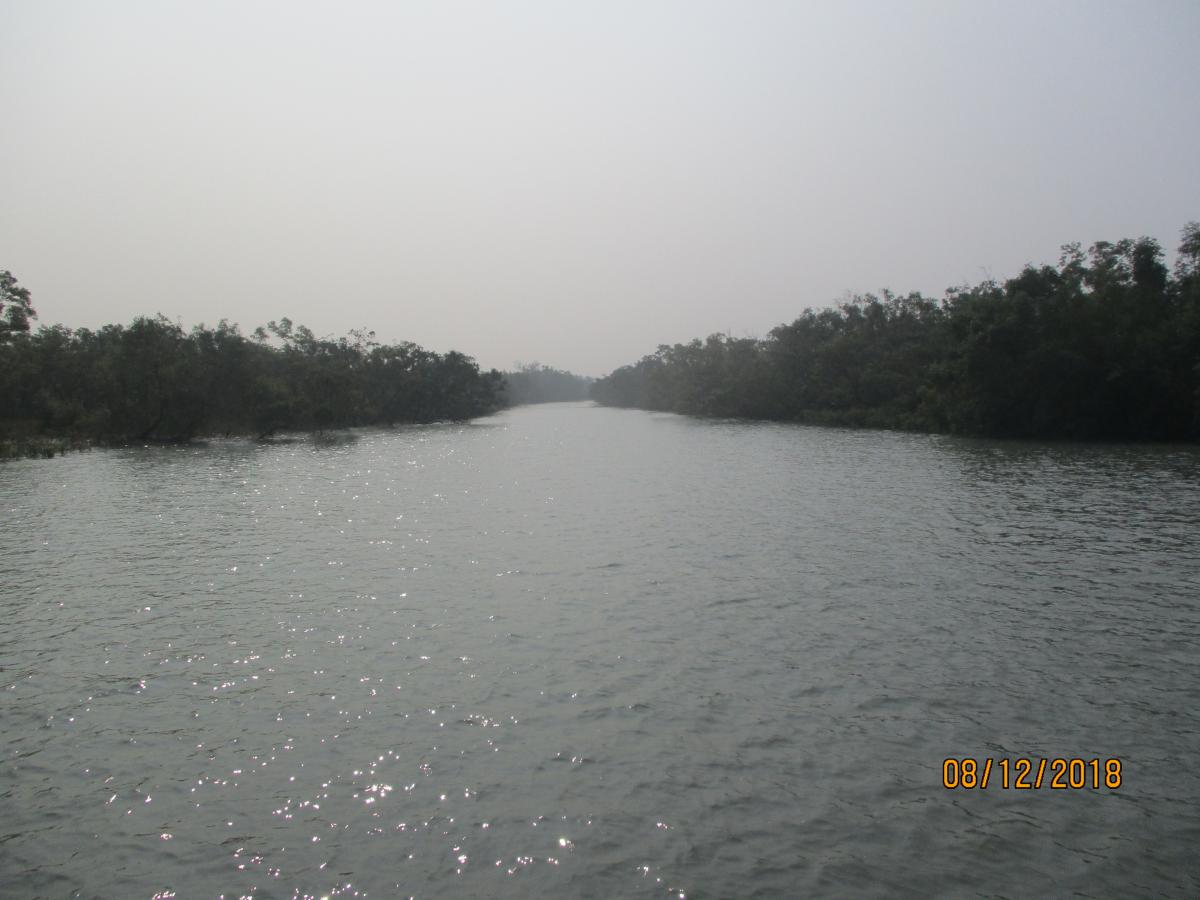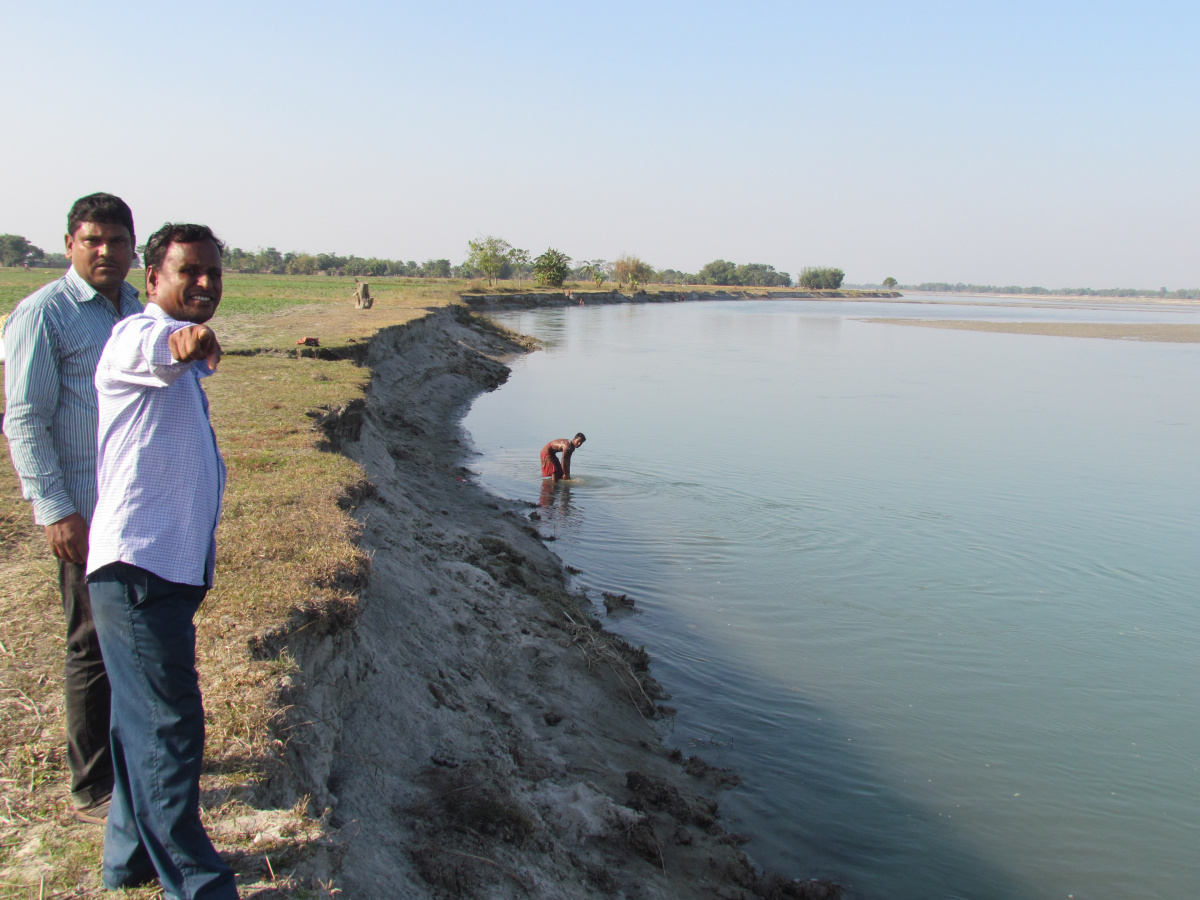United Nations DESERTIFICATION AND DROUGHT DAY: Why Nature Based Solutions (NbS) are Reliable answers to Combat Desertification.
UN Desertification and Drought Day is celebrated on 17 June each year. The year of 2020 focuses on changing public attitudes to the leading driver of desertification and land degradation: humanity’s relentless production and consumption, under the theme “Food. Feed. Fibre.” This year also marks the United Nations Decade for Ecosystem Restoration (2010-2020) and the global fight against Desertification. On this occasion, IUCN India hosted a virtual discussion on “Nature Based Solutions to Combat Desertification”
With the just ended decade on desertification (2010-2020) and entering into the first year of new decade, global conservation community is looking for new momentum for post 2020 biodiversity framework, and further roadmap for climate change and biodiversity conservation challenges along with United Nations Convention to Combat Desertification (UNCCD) related land degradation neutrality targets and Bonn Challenge commitments at the global and national level.
IUCN World Conservation Congress and members’ assembly in 2016 adopted Nature-based Solutions (NbS) as actions to protect, sustainably manage and restore natural or modified ecosystems that address societal challenges effectively and adaptively, simultaneously providing human well-being and biodiversity benefits. A nature-based solution uses the tools that nature already provides to address issues resulting from poor land or resource use, climate change or societal challenges. Solutions often enhance existing natural or man-made infrastructure and spur long-term economic, social and environmental benefits. In this regard, IUCN will be launching nature based solutions standards in July 2020.
An estimated food waste every year has grown to over 1.4 billion hectares. (UNCCD ES;2020) By wasting food, we indeed waste land and water, we waste our biological resources, we emit carbons and we jeopardize the future of new generations. Not only this, the land is also used to graze and produce grains to feed animals makes up 80 per cent of agricultural land.
India has also taken a number of conservation initiatives to address degradation, restoration and water conservation related challenges. India is part of global Bonn Challenge pledge of Forest Landscape Restoration over 150 million hectares by 2020 and 350 million hectares by 2030. India as part of its commitment has pledged for 13million hectares under Forest Landscape Restoration by 2020 and additional 8 million hectares by 2030. With a country like India, who has a huge population to support, it is important that the limited resources are judiciously used. Therefore, in September 2019, during UNCCD CoP 14, Hon’ble Prime Minister of India enhanced India’s commitment by additional 5 million hectares under Landscape Restoration, making the total commitment of 26 million hectares.
In this regards, IUCN India with our eminent panel of speakers Sadhguru (Founder, Isha Foundation) and Dr. Pradeep K Monga (Deputy Executive Secretary, UNCCD) held a dialogue on tackling land degradation through Cauvery Calling project which was followed by a discussion on Aravalli landscape and Water Conservation Initiatives by Government of Haryana between the panel of Dr. Pradeep K Monga (Deputy Executive Secretary, UNCCD), Mr. Randeep Hooda (Film Actor and UNEP-CMS Ambassador of Migratory Species), Dr. Amarinder Kaur, IFS (Principal Chief Conservator of Forests, Government of Haryana), Shri. G. V. Reddy, IFS (Principal Chief Conservator of Forests, Government of of Rajasthan) and Dr. Vivek Saxena (Country representative, IUCN India).
A video message by Mr. Ibrahim Thiaw, Executive Secretary, UNCCD encouraged the viewers to take care of nature in order to be taken care of humans and focussed his appeal for “Food, Feed and Fiber” to tackle land degradation. He stressed that if humans intrude into nature and wild spaces, more zoonotic diseases can emerge and can disrupt the supply of ecosystem services. He encouraged that each person can choose to protect nature by making the right choices for instance, not wasting food, reducing the fast fashion trends.
Dr. Vivek Saxena, Country Representative, IUCN highlighted that land, including its water bodies, provides the basis for human livelihoods and well-being through primary productivity, the supply of food, freshwater, and multiple other ecosystem services. The current geographic spread of the use of land, the large appropriation of multiple ecosystem services and the loss of biodiversity are unprecedented in human history. Land degradation leads to the reduction or loss of the biological or economic productivity and complexity of land.
Sadhguru, Founder, Isha Foundation, who attended UNCCD CoP 14 and advocated for people’s movement to fight against land degradation in India, shared his views on soil conservation. He highlighted that 60-65% population of India is engaged in agriculture and almost 52% agriculture land has been declared degraded land. Conclusively, soil health determines almost all aspects of agriculturally dependent lives. Conserving soil means conserving water, air, land productivity and biodiversity. In a democracy, people’s participation is critical and additionally, it should be included in political manifesto to facilitate government funds. Without involvement of large budgets, government intent and policies that are directed towards ecological wellbeing, the real solution will remain a far-fetched dream. He also shared views about his campaigns “Rally for Rivers” and “Cauvery Calling”.
Dr. Pradeep Monga, Deputy Executive Secretary, UNCCD stated that land is directly related to green livelihoods and income levels. He supported this by highlighting the fact that every $1 invested in land leads to yield of $10-15 leading to increase of farmer’s income by 5-10%. Its critical for us to use resources more productively in nature friendly ways like agriculture resilient technologies for us to win the battle of land degradation. Land is not only important to tackle degradation but also biodiversity conservation and climate change. He urged people to build a social contract with nature for a healthy planet.
Dr. Amarinder Kaur and Shri G. V. Reddy highlighted various schemes launched by the Government of India such as: Pradhan Mantri Fasal Bima Yojana (PMFBY), Soil Health Card Scheme, Soil Health Management Scheme, Pradhan Mantri Krishi Sinchayee Yojna (PKSY), Per Drop More Crop, etc. which are helping to reduce land degradation. ‘Atal Bhujal Yojana’ (sustainable groundwater management) to promote panchayat led ground water management and behavioural change with primary focus on demand side management ‘Jal, Jeevan Mission’ of the Department of Drinking Water & Sanitation, Ministry of Jal Shakti is also closely working with the other government programmes to achieve their mission of provide safe and adequate drinking water through individual household tap connections by 2024 to all households in rural India.
Dr. Amarinder also discussed Government of Haryana initiative of “Crop Diversification Pilot Scheme”- “ Mera Pani Meri Virasat” under the leadership and vision of Sh Manohar Lal Khattar, Chief Minister,Haryana and “Jal Hi Jeevan Hai” mission to encourage the farmers to adopt crop diversification and sow crops which consume less water like Maize, Sesame, Lond Bean, lentils, and other crops instead of paddy in 50,000 hectares in paddy dominated districts. Positive and committed initiatives such as 500 metres Eco Sensitive Zone in Manger, Aravalli landscape and other initiatives in arid zones for water conservation are the steps that will ensure sustainability of Natural Resources and water conservation in times to come. For restoration and checking advancement of desertification, Govt. of Haryana has also initiated steps for biodiversity conservation in Aravalli landscape. The seed balls containing indigenous Aravalli species will be broadcasted during upcoming monsoon season.
Mr. Randeep Hooda, Film Actor and UNEP-CMS Ambassador highlighted the importance of Aravalli Landscape, in Haryana for various species of flora and fauna and unplanned agriculture activities that have created water related issues in the area. He pointed out the connection between land degradation and habitat degradation. He made a mass appeal and called all stakeholders to come together and address the behavioural issue of exploitation guided by short term goals and benefits. He urged public to start a conversation on what one can do every day to save nature and be curious about our planet, learn more to contribute more. Small sustainable actions like close the tap, use public transport, reduce plastic use can bring the change.
It is estimated that 25-35% of these drylands are already degraded, with over 250 million people directly affected and about one billion people in over one hundred countries at risk.
As per a 2016 report by the Indian Space Research Organisation, 96.40 million hectares area (29.32 percent of India’s total area) of India witnessed land degradation during 2011-13. It also revealed that around 23.95 percent of desertification/land degradation, with respect to the total geographical area of the country, was in Rajasthan, Maharashtra, Gujarat, Jammu and Kashmir, Karnataka, Jharkhand, Odisha, Madhya Pradesh and Telangana (in descending order) in that period.
Despite accelerating trends of land degradation, reversing these trends is attainable through restoration efforts and proper implementation of sustainable land management, which is expected to improve resilience to climate change, mitigate climate change, and ensure food security for generations to come.
The webinar highlighted some of these innovative solutions/models and the supportive financial and institutional mechanisms required. The webinar was very well attended by experts, Foresters, Conservation practitioners and policy makers who are at the forefront of leading several initiatives to halt land degradation and biodiversity loss.
The recording of the webinar is available here.
For further details, please contact: Ms Aanchal Saxena (aanchal.saxena@iucn.org)

